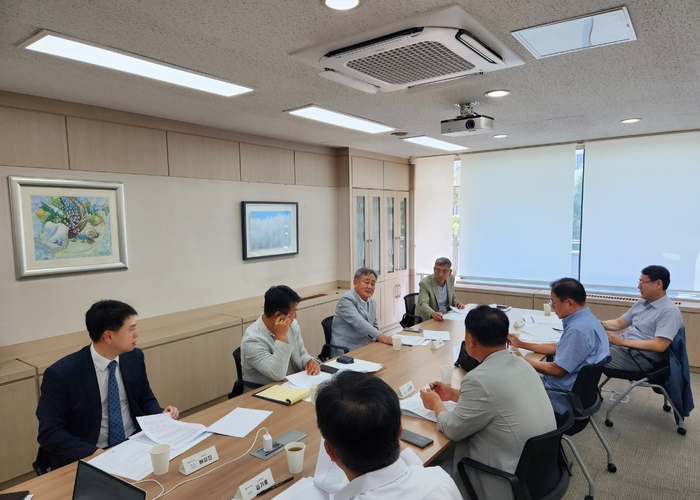The Korea Golf Association, 8 regional councils, and the golf course operation system improvement committee will discuss major pending issues in the overall operation, including the rate system, reservation system, taxation system, and manpower shortage
 사진 확대 The Korea Golf Course Management Association held a meeting of the golf course operation system improvement committee. Korea Golf Club Management Association
사진 확대 The Korea Golf Course Management Association held a meeting of the golf course operation system improvement committee. Korea Golf Club Management Association
The Korea Golf Course Management Association announced on the 27th that it held a meeting of the “Golf Course Operation System Improvement Committee” in the association’s conference room in Bundang, Seongnam-gu, Gyeonggi-do on the 21st and discussed major issues across the operation of the golf course, including the rate system, reservation system, taxation system, and manpower shortage.
Representatives from member companies of eight regional councils, including Chairman Choi Dong-ho, attended the meeting to discuss the deficiencies of the current system and seek ways to improve it. First of all, regarding the integrated pricing plan of Green Pee and Cart B, the industry agreed on the necessity of introducing the system, but agreed to respect the autonomous operation of individual golf courses as there were concerns that it could be seen as a rate hike.
Regarding the reservation cancellation and penalty system, they all agreed on the principle of allowing cancellation in case of inevitable weather conditions such as rain and lightning, and there was an opinion that it is appropriate to strengthen the penalty imposition standard and adjust it to “cancel seven days in advance”. It was also pointed out that the issue of the collective sale of reservation agencies at some golf courses could lead to consumer damage. As a result, there is a consensus in the industry that it is necessary to strengthen the real name verification process for reservations and companions.
Regarding the issue of bringing in food, it is decided to allow industrial products such as water and beverages, but to refrain from bringing in cooked foods that are at risk of food poisoning. He also emphasized that complaints about food and beverage prices can be explained by structural factors such as labor costs and management costs unique to golf courses.
In the tax sector, the need for property tax reduction and investment tax credit was raised. In particular, there were many opinions that related tax standards need to be reorganized in that welfare facilities such as cart storage and employee dormitories could be subject to tax benefits.
The issue of serious manpower shortages was also addressed as a key agenda item. In addition to the current H-2 visa, a plan to expand the employment of foreign workers to E-9 visas and to make safety and language education mandatory for each job will be prepared and proposed to related ministries. In addition, there were many opinions that the regulatory system and standard terms and conditions should be simplified to two categories from the existing three-classification system and recognized the specificity and operational diversity of each golf course, so they agreed on the need for standardized terms and conditions to be improved.
“The golf industry is a daily sport enjoyed by more than 5 million people and an important pillar of the tourism and service industry,” said Choi Dong-ho, chairman of the Korea Golf Course Management Association. “We will prepare a reasonable system improvement plan based on the voices of the field and actively deliver it to the government and related organizations.”





